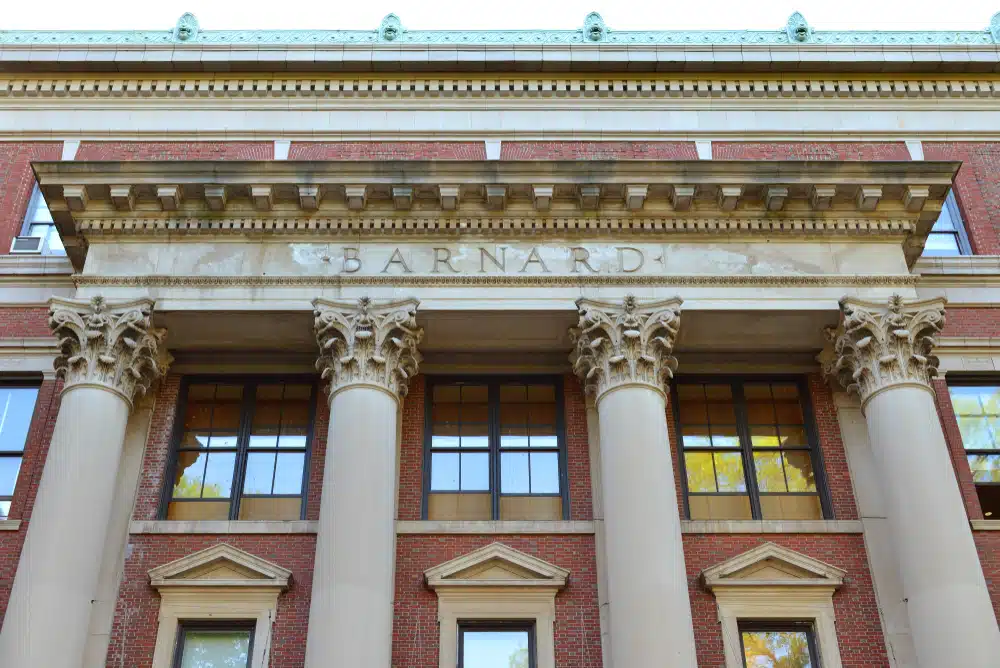Barnard Early Decision and Regular Decision Notification Dates Class of 2028
Understanding Barnard’s Early and Regular Decisions notification dates is crucial for prospective students aiming for the Class of 2028. Barnard College, a prestigious institution known for its rigorous academics and vibrant campus life, is a dream destination for many high school students. As application seasons roll around, understanding the timeline for ED and RD notifications becomes paramount.
This knowledge not only helps in planning your application strategy but also in managing expectations and preparing for the next steps in your educational journey. For a comprehensive understanding of Barnard’s admission timelines and how they can impact your college planning, read on to learn more.
Barnard Early Decision Notification Date Class of 2028
Barnard College, a prestigious women’s college affiliated with Columbia University in New York City, offers an Early Decision (ED) program for students demonstrating strong interest and commitment to attending the college. In this program, you make a binding agreement to enroll at Barnard if admitted. It’s crucial for you to understand the timeline and specifics of this process, especially if you consider Barnard your top-choice college.
When Does Barnard Early Decision Come Out?
Applying to Barnard College through Early Decision brings a mix of anticipation and preparation. If you choose this path, expect to receive your admission results in mid-December. This consistent timeline gives you a reliable reference for when you will learn about one of the most significant decisions in your educational journey.
Deciding to apply early reflects your certainty that Barnard is your preferred choice. The college reciprocates this commitment with an expedited review process, aiming to deliver decisions by mid-December. This timing ensures you have enough time to plan for your college life at Barnard or consider other options.
The mid-December notification also helps you enjoy a more relaxed holiday season, freeing you from the anxiety of a prolonged wait. Additionally, this timeline aligns with the schedules of many other institutions, providing a synchronized timeline for the college admission process nationwide.
What Time Does Barnard Early Decision Come Out?
While Barnard College historically does not specify an exact time for releasing early decision notifications, the announcements typically occur during business hours, Eastern Time. Due to the unpredictability of exact times, it’s advisable for you to remain vigilant throughout the notification day.
Not specifying an exact time allows the admission office flexibility in managing the complex decision-release process. It also helps manage server load on online portals, as a specific time can lead to a surge in traffic and potential technical issues.
For you, this means checking your email and the Barnard admission portal regularly for updates. Make sure your email system receives notifications from Barnard’s domain to prevent important emails from being marked as spam. Also, keep an eye on Barnard’s official social media channels for updates on admission notifications.
Preparing for the emotional aspect of receiving your decision is important. Whether the outcome is positive or not, having a support system, like family members or school counselors, can be immensely beneficial. If you receive a favorable decision, your next steps include understanding financial aid packages, housing options, and course selections. If your journey with Barnard ends here, remember that there are numerous other pathways to success and many institutions where you can thrive academically and personally.
In conclusion, while Barnard College does not specify the exact time for early decision notifications, staying informed, prepared, and supported during this time is essential. The anticipation of this decision is a significant part of the college application journey, and understanding its nuances can help you navigate it with more confidence and less stress.
Barnard Regular Decision Notification Date Class of 2028
As a top choice for many high school seniors, Barnard College has specific notification dates for the Class of 2028 Regular Decision, which is crucial for you to understand. The excitement and nervousness you might feel as you await these college admission decisions are completely natural.
When Does Barnard Regular Decision Come Out?
Located in the heart of New York City, Barnard College offers a rigorous academic environment and an empowering community. The college typically announces its regular decision results in late March. This consistent schedule allows you to have a clear expectation of when to expect your results, helping you mentally and logistically prepare for the big day. Over the years, Barnard has consistently adhered to this timeline.
At Barnard, the admissions committee comprehensively and holistically reviews each application. They evaluate a range of factors, such as your academic performance, extracurricular activities, personal essays, and letters of recommendation. The committee dedicates enough time to this thorough review process to ensure a fair and comprehensive evaluation of each applicant, leading to the release of decisions in late March.
The moment you receive your regular decision results marks a significant milestone. It represents years of hard work and dedication. As you wait for your results, staying engaged in your current academic and extracurricular commitments is essential. Also, start thinking about potential outcomes. Whether you get accepted, waitlisted, or not admitted, each outcome is a forward step in your educational journey.
In the weeks leading up to the decision release date, make sure you have access to your email account and Barnard’s application portal. Keeping your contact information up-to-date is crucial to ensuring you receive the decision notification on time. Also, familiarize yourself with the college’s procedures for accepting an offer of admission, in case you get one.
What Time Does Barnard Regular Decision Come Out?
Barnard College historically releases its regular decision announcements in the evening, although the exact time can vary from year to year. For example, in 2023, Barnard announced its regular decision results at 7 p.m. Eastern Time. You can use this as a general reference for when to expect your decision in 2024.
The college chooses the decision release time to accommodate a wide range of time zones, considering the diversity of its applicant pool. Releasing decisions in the evening Eastern Time allows students across the United States to receive their results simultaneously and is also a feasible time for many international applicants.
As you await your decision from Barnard, the day can be an emotional rollercoaster. Planning a flexible day to process the outcome is important, regardless of what it may be. Surrounding yourself with supportive friends or family can be comforting, creating a positive environment to share the moment.
Leading up to the announcement, managing stress through relaxing activities or hobbies can be helpful. Remember, college decisions do not define your worth or potential. Your journey is unique and filled with growth and success opportunities, regardless of the outcome.
On decision day, periodically check your email and Barnard’s application portal, especially as the expected time approaches. However, try to avoid obsessively refreshing the page, as this can heighten your anxiety. Keeping your day as normal as possible and engaging in your regular activities can help maintain a sense of calm.
The anticipation of Barnard College’s regular decision results can be stressful, but it is also a time filled with hope and potential. Barnard’s commitment to a holistic admissions process ensures that your application receives the attention it deserves. As you await your results in late March, typically around 7 p.m. Eastern Time, stay positive, prepare for all possible outcomes, and remember that this is just one step in your larger educational journey.
Is it Worth it to Go to Barnard College?
Deciding to attend Barnard College sets your future’s course. Known for academic excellence, commitment to women’s empowerment, and a unique partnership with Columbia University, Barnard offers a distinctive educational experience. At Barnard, you gain knowledge, develop critical thinking skills, gain a global perspective, and strengthen your sense of self.
Barnard challenges you academically while providing you with the support you need to succeed. The dedicated faculty fosters an environment of intellectual curiosity and innovation. Small class sizes ensure you receive personalized attention, encouraging deep engagement with coursework and meaningful interactions with professors.
Barnard’s emphasis on women’s leadership stands out. As a women’s college affiliated with Columbia University, it offers an empowering environment focused on developing strong, confident leaders. Regular workshops, seminars, and talks by leading women across various fields provide you with invaluable insights and networking opportunities. This focus extends beyond the classroom, encompassing student organizations and activities dedicated to social justice and environmental advocacy.
A Barnard education prepares you for a range of career paths. The college’s top-notch career services offer guidance from internships to job placements. With a global network of successful alumnae, you gain access to mentorship and career advancement opportunities. A strong liberal arts education equips you with skills like critical thinking, effective communication, and problem-solving valued in today’s job market.
Barnard’s location in New York City enhances your college experience. Internships at global corporations, research opportunities at renowned institutions, and cultural experiences at world-famous museums and theaters are all within your reach. This vibrant urban setting serves as a backdrop for a diverse and dynamic campus life, bringing together students from around the world.
Your educational experience at Barnard is further enriched through its partnership with Columbia University. You enjoy cross-registration opportunities, allowing you to take advantage of a broader range of courses and resources. This collaboration extends to extracurricular activities, where you can join clubs and organizations across both campuses. Graduating with a degree from Barnard means carrying the recognition of both Barnard College and Columbia University.
Barnard stands out for its comprehensive wellness programs and resources. Recognizing the importance of mental and physical health for academic success, the college provides counseling, health education, and wellness programs. These services support you in all aspects of college life, ensuring you have the tools to thrive.
The sense of community at Barnard is unparalleled. The college fosters an environment where you feel valued and connected, from the first-year experience to senior-year traditions. This sense of belonging, combined with opportunities for personal growth and academic excellence, makes Barnard a unique place to study.
Attending Barnard College is an investment in a future of endless possibilities. With rigorous academic programs, a focus on women’s leadership, a powerful network, and a vibrant campus life, Barnard prepares you not just for a successful career but for a life of meaningful impact. The college’s location, partnership with Columbia University, and comprehensive support services enhance the value of a Barnard education. If you seek a college experience that is both challenging and rewarding, Barnard College is undoubtedly worth considering.
How Does Barnard Notify Acceptance?
After being aware of the key dates for Barnard’s Early Decision and Regular Decision notifications for the Class of 2028, understanding their acceptance notification process becomes crucial. Barnard College stands out for its prestigious academic programs and vibrant campus community, maintaining a transparent and efficient admissions communication process. For acceptance notifications, the college employs modern digital methods to quickly and directly communicate with you, reflecting its commitment to an organized and applicant-friendly admission process.
Barnard College primarily informs applicants of their admission status through email and the online admission portal. This dual-channel approach ensures you receive your admission results conveniently. The email, typically the first point of contact, formally notifies you of your admission status. Barnard personalizes these emails, providing detailed next steps for accepted, waitlisted, or rejected candidates and emphasizing individual attention and care for each applicant.
The online admission portal serves as a comprehensive hub for all admissions-related information. After submitting your application, you will receive login credentials to access this portal, where you can track your application status, view any missing documents, and ultimately receive your admission decision. The portal’s user-friendly and informative design offers a detailed overview of your journey through the admission process.
Ensuring Updated Contact Information
Keeping your contact details current in Barnard’s system is vital in the digital age, where information is exchanged rapidly online. Accurate email addresses and phone numbers in the college’s records are crucial not just for receiving the admissions decision but also for getting important updates regarding financial aid, housing, orientation programs, and other critical information impacting your decision-making and preparation for college.
To update contact details, you should regularly log into the admission portal. Promptly updating any changes in phone numbers, email addresses, or mailing addresses ensures all communications from Barnard reach you without delay. Additionally, make sure your email settings do not filter out emails from Barnard College as spam or junk, as this can inadvertently lead to missing important notifications.
What Happens After the Notification?
Upon receiving the admission notification, your next steps depend on your admission status. Accepted students typically have a set timeframe to accept or decline the offer of admission. This crucial decision often involves discussions with family, financial planning, and consideration of other offers.
If you are waitlisted, the process involves indicating your continued interest in Barnard and possibly submitting additional information or letters of recommendation. Being on the waitlist can be a time of uncertainty, so understanding the likelihood and timeline for a final decision is important.
If not accepted, it’s essential to process this outcome and consider alternative options. This might mean looking at other colleges where you have been accepted, exploring gap year opportunities, or considering community college as a stepping stone to your educational goals.
Staying Informed and Prepared
Beyond the initial acceptance notification, Barnard College communicates other vital information to incoming students. This includes details about housing applications, orientation schedules, and course registration. Paying close attention to all communications from the college and adhering to specified deadlines and requirements is crucial for a smooth transition to college life.
The college’s admission office is a valuable resource for any queries or clarifications. Whether it’s questions about financial aid packages, campus life, academic programs, or housing options, Barnard’s admission officers are ready to assist and guide you.
Understanding how Barnard College notifies applicants of their admission status is just the first step in joining this esteemed institution. By keeping your contact information updated, actively engaging with the admission portal, and following up on post-notification steps, you can navigate the admission process confidently and smoothly. Barnard’s approach to admission notifications reflects its commitment to a student-centered experience, ensuring you receive the necessary information and support throughout this critical phase of your academic journey.
Financial Aid and Scholarships at Barnard
Understanding the Barnard Early Decision and Regular Decision notification dates for the Class of 2028 is essential, as it frames the timeline for managing other important aspects, such as financial aid and scholarships. Navigating the world of financial aid and scholarships can be as challenging as the college application process, especially at prestigious institutions like Barnard College. To help you manage the costs of attending this esteemed college, this guide provides crucial information about Barnard’s financial aid process.
Barnard College designs its financial aid system to ensure all students, regardless of their economic background, can access education. The college offers scholarships, grants, and loan opportunities, aiming to meet every admitted student’s full demonstrated financial need.
When to Apply for Financial Aid
Timeliness is crucial in financial aid applications. You must meet deadlines to succeed in the financial aid process. Typically, financial aid application deadlines align closely with admissions application deadlines. Early decision applicants usually need to submit financial aid documents by early November, while regular decision applicants should aim for early February. Always check Barnard’s official website for the most current deadlines to submit all materials on time.
Types of Financial Aid Available
The college offers a range of financial aid options to assist students in meeting their educational expenses. These options are tailored to cater to different financial situations and needs. Here’s a more detailed look:
- Need-Based Scholarships: Need-based scholarships are financial awards provided to students based on their family’s financial circumstances. These scholarships do not require repayment. The amount awarded varies, ensuring equitable support based on each student’s unique financial situation.
- Grants: Grants, like need-based scholarships, are funds that students are not required to repay. They may originate from various sources, including federal, state, and institutional programs. Grants often target specific groups of students, such as those with exceptional academic records or those pursuing particular areas of study.
- Work-Study Programs: Work-study programs offer part-time employment opportunities to students, allowing them to earn money for their educational expenses. These positions can be on campus or in roles serving the community. Besides providing financial support, work-study programs also offer valuable work experience and networking opportunities.
- Loans: Loans are a form of financial aid that involves borrowing money that must be repaid, including interest. There are several types of loans, such as federal student loans, which generally offer lower interest rates and more flexible repayment options compared to private loans. Loans are considered a last resort due to the necessity of repayment and the long-term financial commitment they entail.
These financial aid options at Barnard College collectively ensure that students from various financial backgrounds have access to education. By combining need-based scholarships, grants, work-study programs, and loans, Barnard provides a comprehensive financial aid package to meet the diverse needs of its student body.
How Barnard Calculates Financial Need
Barnard College, like many institutions, has a systematic approach to determining a student’s financial need. The process begins with the submission of the Free Application for Federal Student Aid (FAFSA) and the College Scholarship Service (CSS) profile. These applications are critical as they collectively provide a comprehensive picture of a family’s financial status.
This includes detailed information on income, assets, debts, and the number of dependents in the household. The CSS Profile, in particular, is instrumental in capturing nuanced financial details that the FAFSA might overlook, such as non-custodial parent income or family-owned business assets.
Upon receiving these applications, Barnard’s financial aid office employs a formula to calculate the Expected Family Contribution (EFC). The EFC is an estimate of the amount a family can contribute towards the student’s education for one academic year.
This calculation considers various factors, including family income, the number of family members attending college simultaneously, and living expenses. It’s important to note that Barnard’s method of calculating EFC may differ from the federal EFC calculated through the FAFSA, as Barnard may use additional criteria in its assessment.
Once the EFC is determined, Barnard compares it against the total cost of attendance, including tuition, room, board, books, and other educational expenses. The difference between the cost of attendance and the EFC is considered the student’s financial need.
Based on this need, Barnard’s financial aid office will then put together a financial aid package, which could include grants, scholarships, work-study opportunities, and loans. It’s crucial for students and families to understand that the calculated EFC and financial need are not a guarantee of the aid amount but serve as a guide for what the college can offer.
Tips for a Successful Financial Aid Application
When it comes to securing financial aid for your college education, meticulous preparation and attention to detail can significantly increase your chances of success. The process may seem daunting, but with the right approach, you can navigate it effectively. Here are some valuable tips to help you through the financial aid application process:
1. Complete Applications Accurately and Completely
Begin by carefully reading through the financial aid application instructions. This will give you a clear understanding of what information is required. Ensure that all personal and financial information is accurate and up-to-date. Any discrepancies can lead to delays or even denials. Double-check your application for completeness. Missing or incomplete sections can also hinder your chances of receiving aid.
2. Honesty Is the Best Policy
It’s crucial to be honest about your financial situation. Falsifying information on your application can have serious consequences, including the loss of financial aid. If you have any questions or concerns about a particular section, don’t hesitate to seek guidance from a financial aid counselor at your college or university.
3. Thorough Documentation Matters
Some financial aid applications may require supporting documentation, such as tax returns or bank statements. Ensure that you provide all requested documents accurately and promptly. Keep copies of all submitted materials for your records. This can be helpful in case there are any discrepancies or follow-up questions.
4. Craft a Compelling Personal Statement or Essay
Many scholarship applications include a personal statement or essay requirement. This is your opportunity to stand out and showcase your unique qualities. Take your time to write a thoughtful and well-structured essay. Explain why you deserve the scholarship, your goals, and how it aligns with your academic journey.
5. Tell Your Unique Story
Your personal statement should reflect your individual experiences, challenges, and aspirations. Share your journey, including any obstacles you’ve overcome and the lessons you’ve learned. Highlight your passion for your chosen field of study and how receiving financial aid will help you achieve your educational goals.
6. Proofread and Edit Carefully
Spelling and grammatical errors can detract from the impact of your personal statement. Proofread your essay carefully or ask someone you trust to review it. Ensure that your writing is clear, concise, and free of jargon. Admissions committees appreciate well-organized and articulate responses.
7. Seek Letters of Recommendation
Some scholarships require letters of recommendation. Choose individuals who can speak to your character, achievements, and potential. Request these letters well in advance and provide your recommenders with any necessary information about the scholarship and application deadlines.
8. Submit Applications Early
Don’t wait until the last minute to submit your financial aid applications. Some scholarships and grants have early deadlines, and applying early can give you an advantage. Be aware of all relevant deadlines and make a schedule to ensure you have ample time to complete each application thoroughly.
9. Stay Informed About Additional Aid Opportunities
Beyond federal aid and scholarships, explore other financial aid options, such as grants and work-study programs. Keep an eye on local, state, and institutional aid opportunities that may be available to you.
10. Follow Up and Stay Organized
After submitting your applications, maintain a record of all correspondence and communications related to financial aid. Follow up with colleges or organizations if you have not received a response by the specified deadline. Being proactive shows your commitment to securing aid.
Attending Barnard College is an investment in your future. While the cost may seem daunting, Barnard’s robust financial aid program is designed to make a Barnard education accessible and affordable. By understanding the types of aid available, meeting application deadlines, and exploring all potential scholarship opportunities, you can take proactive steps toward making your dream of attending Barnard a reality.
Understanding the Barnard Admission Process
Once you are informed of the Barnard College Early Decision and Regular Decision notification dates for the Class of 2028, it becomes crucial to understand the nuances of their admissions process. Barnard College, a prestigious institution in the heart of New York City, offers a unique blend of liberal arts education and resources from a larger university.
Its renowned admissions process thoroughly and holistically reviews each application, focusing on more than just grades and test scores. This comprehensive approach aims to find students who will excel academically and contribute significantly to the Barnard community.
In Barnard’s admissions process, several key components of your application come together to provide a multifaceted view of who you are beyond just numbers.
1. Academic Records
Your academic record is crucial to your application. Barnard College emphasizes your high school performance, examining the rigor of your courses, grades achieved, and overall academic trends. Favorably viewed are consistent performances in challenging courses like Advanced Placement (AP), International Baccalaureate (IB), or honors classes. Nevertheless, Barnard also considers the context of your academic journey, recognizing improvements over time or overcoming academic challenges.
2. Standardized Test Scores
While not the sole factor, standardized test scores are important, offering a common measure to compare students from different schools and backgrounds. Note that Barnard College, like many institutions, adopts a test-optional policy for certain admission cycles. Always check the latest admission policy regarding standardized tests to make informed decisions about submitting your scores.
3. Extracurricular Activities
Barnard values students who demonstrate passion and leadership in extracurricular activities, such as school clubs, sports teams, community service, or personal projects. The admissions committee is more interested in the quality of your engagement than the quantity of activities. They want to understand how your involvement has shaped your character and skills. Impress them with your leadership roles, consistent commitment, and impact on your community or organization.
4. Essays
Your application essays are a crucial opportunity to articulate your voice and personality. Barnard’s prompts often encourage reflection on personal experiences, intellectual interests, and world perspectives. A well-crafted essay provides deep insights into your thinking, creativity, and potential contributions to the Barnard community. Being authentic and introspective in your essays helps you stand out among highly qualified candidates.
5. Letters of Recommendation
Letters of recommendation give insight into how you interact with teachers and peers in an academic setting. Barnard College requires letters from teachers in core academic subjects and a counselor recommendation. These letters should highlight your intellectual curiosity, engagement in learning, and personal qualities such as resilience, empathy, and leadership. Choose recommenders who know you well and can provide specific examples of your contributions and growth.
6. Interviews
Interviews, though not mandatory, are an excellent way for you to further demonstrate your interest in Barnard and add a personal touch to your application. When available, interviews are typically conducted by alumni and offer you a chance to discuss your academic interests, extracurricular involvements, and reasons for applying to Barnard.
7. Additional Components
For some applicants, additional components like portfolios, research papers, or supplemental essays might be relevant. If you have particular talents or achievements in areas like art, music, writing, or scientific research, consider submitting these with your application. This showcases your unique skills and passions, which might not be evident in other parts of your application.
8. The Context of Your Application
Barnard’s admission process considers the individual context of each application. Factors such as your school environment, family background, and any challenges you’ve faced are taken into account. This contextual review ensures a fair evaluation of each applicant within the scope of their circumstances.
The Final Decision
Barnard’s admission committee makes its final decision after a comprehensive and careful review of each application. They evaluate each application holistically, selecting a diverse and dynamic group of students who will thrive at Barnard and contribute to its vibrant community. As an applicant, presenting a complete and authentic picture of yourself is crucial, highlighting not just your academic prowess but also your character, passions, and potential to make a difference.
Understanding the entirety of the Barnard admissions process is instrumental in crafting a compelling application. As a prospective student, approach each component thoughtfully and authentically, aligning your application with Barnard College’s ethos and values.
Tips for Prospective Barnard Students Awaiting Decisions
Once you are informed about the notification dates for Barnard College’s Early Decision and Regular Decision for the Class of 2028, it becomes essential to stay cognizant of how you manage the waiting period. When you submit your application to Barnard College, the anticipation and anxiety can fill the time as you wait for a decision.
This period, while uncertain, offers an excellent opportunity for personal growth and preparation for any outcome. Managing this waiting time effectively is crucial, not just to maintain your peace of mind but also to prepare for the next steps, whatever the decision may be.
How to Stay Productively Engaged While Waiting
It’s important for you to stay positively occupied during this waiting period. This time is perfect for delving deeper into your current interests or exploring new hobbies. If you love literature, consider starting a book club with friends or exploring a new genre. Community service or part-time work can also be fulfilling, adding valuable experiences to your profile.
Academic enrichment is another productive way to use this time. Enrolling in online courses or workshops that align with your intended major or interests keeps your mind active and shows your commitment to continuous learning, a quality highly valued in the academic world.
Preparing for Multiple Outcomes
Prepare for the various outcomes of your application. While staying optimistic is important, being realistic helps you handle any situation gracefully. If you receive an acceptance, plan the steps you’ll need to take next, such as financial planning, housing arrangements, and course selection. If the decision isn’t favorable, consider your alternatives, like applying to other colleges, taking a gap year, or exploring community college options.
Building a Support System
A support system during this time is invaluable. Maintain open communication with family, friends, and mentors who understand your aspirations and concerns. They can provide emotional support and practical advice. Also, connecting with other applicants through online forums or social media can offer a sense of community and shared experience.
Staying Informed and Updated
Keep yourself updated with Barnard’s announcements and any communications they send out. Participating in informational webinars or Q&A sessions for prospective students can provide additional insights into the college and its culture.
Mindfulness and Stress Management
Paying attention to your mental health during this period is crucial. Mindfulness, meditation, and regular exercise can effectively reduce stress. Engaging in relaxing activities like painting, playing a musical instrument, or taking walks can help keep anxiety in check.
Exploring Plan B Options
As you await Barnard’s notification dates for the Class of 2028, both Early Decision and Regular Decision, it’s beneficial to explore other opportunities and Plan B options. Research other colleges and universities, their application deadlines, and requirements. This not only gives you a backup plan but also helps keep a balanced perspective. Remember, your future doesn’t depend on a single college decision; many paths lead to success.
Reflecting on Personal Growth
Use this time to reflect on your personal journey and growth. The college application process is an important milestone, marking your transition from high school to higher education. Reflecting on your achievements, challenges overcome, and lessons learned during high school can be a rewarding exercise, offering insights into your strengths and areas for improvement.
Engaging in Self-Care
Don’t overlook the importance of self-care. Make sure you’re getting enough sleep, eating healthily, and engaging in activities that bring you joy and relaxation. Maintaining a balanced lifestyle is crucial for your overall well-being during this potentially stressful time.
Setting Realistic Expectations
Finally, set realistic expectations for yourself. While hoping for the best is natural, understanding that the college admissions process is highly competitive and multifaceted can help you manage your expectations. Whatever the outcome, know that it’s not a reflection of your worth or potential.
Exploring Barnard’s Unique Academic Opportunities
In the heart of New York City, Barnard College combines rigorous academics with enriching opportunities. As a women’s college affiliated with Columbia University, Barnard empowers women through a supportive community and diverse academic offerings.
Special Majors and Interdisciplinary Programs
At Barnard, flexibility and breadth define the academic landscape. You can choose from a wide array of majors, many of which Barnard uniquely offers or presents with a distinct twist. Take the dance program, for instance. It’s renowned for integrating theory and practice, allowing you to explore dance as both an art form and a medium of cultural expression.
The Urban Studies program at Barnard also stands out with its comprehensive approach, blending sociology, political science, and urban planning. You can dive into urban complexities, tackling issues like gentrification, urban policy, and community development. These majors, rooted in real-world issues, prepare you for diverse career paths and graduate studies.
Research Opportunities and Collaborations
Barnard is known for its robust research opportunities, which are integral to the college’s ethos. The college encourages you to engage in research early on, working alongside faculty on groundbreaking projects. More than just assisting with existing projects, Barnard fosters independent research. You have opportunities to design and conduct your own studies, often leading to national conference presentations and publications in prestigious journals.
Barnard’s collaboration with Columbia University enhances this research-centric approach. You get access to Columbia’s extensive research facilities and libraries, expanding your resource pool. This collaboration enriches your academic experience and allows you to network with a broader spectrum of peers and professionals.
Barnard-Columbia Partnership: Academic and Social Benefits
The partnership between Barnard College and Columbia University is a hallmark of the Barnard experience. This partnership offers you the best of both worlds: a small, women-focused college environment and the resources of a large, prestigious Ivy League university. As a Barnard student, you can take classes at Columbia, join joint clubs, and access Columbia’s facilities, like libraries, laboratories, and dining halls.
This arrangement enhances your educational experience in several ways. Academically, it expands the range of courses available to you, enabling you to explore subjects beyond Barnard’s offerings. Socially, it integrates you into a larger community, promoting diverse interactions and perspectives. The partnership also aids in networking, as you become part of a larger alumni base that is crucial for your professional journey.
Emphasizing Practical Experience and Career Preparation
Barnard extends education beyond the classroom. The college strongly emphasizes applying academic knowledge in practical settings. Programs like the Athena Center for Leadership Studies combine leadership training with practical experience. By engaging in workshops, internships, and mentorship programs, you gain the skills to lead and excel in your field.
Moreover, Barnard’s New York City location offers unparalleled opportunities for internships and cultural experiences. You can intern with leading organizations in various fields, from finance to the arts, gaining valuable real-world experience. This exposure not only enhances your academic learning but also gives you a competitive edge in the job market.
Fostering a Global Perspective
In today’s interconnected world, a global perspective is essential. Barnard addresses this need by offering numerous study abroad programs and global initiatives. You have the chance to study in countries worldwide, gaining exposure to different cultures and educational systems. These experiences, deeply integrated into your academic path, help you understand global issues and perspectives comprehensively.
The diversity of Barnard’s student body, attracting students from all over the world, creates a vibrant, multicultural community. This diversity enriches classroom discussions and fosters a deeper appreciation of different cultures.
Emphasizing the Role of Women in Academia
At its core, Barnard College commits to advancing women in academia and beyond. This commitment shows in the curriculum, research opportunities, and community initiatives. Courses often focus on the roles of women in various fields, highlighting their contributions and challenges throughout history. Research initiatives explore gender-related topics, contributing to the broader discourse on women’s issues.
This focus on women’s empowerment translates into tangible outcomes. Barnard graduates are known for their leadership, resilience, and barrier-breaking abilities in various fields. The college’s alumnae network, with graduates excelling in areas from science and business to the arts and public service, is a testament to this.
Barnard College offers you a unique and enriching academic experience. Its special majors, research opportunities, partnership with Columbia University, practical experience programs, global perspective, and emphasis on women’s empowerment collectively create an environment where you are educated and transformed. These factors are not just academic considerations but pathways to your personal and professional growth.
Alternatives and Next Steps if Not Accepted to Barnard
As you await Barnard College’s notification dates for the Class of 2028, both Early Decision and Regular Decision, remember that receiving a rejection letter can be disheartening, but it does not reflect on your potential or worth.
Many successful people have faced similar setbacks and have gone on to achieve great things. There are numerous pathways to success, and exploring alternative options often leads to unexpected and fulfilling educational journeys.
Exploring Other Colleges and Universities
While Barnard is unique, many other colleges and universities offer excellent programs and opportunities. Look for schools that align with your interests and goals. Consider liberal arts colleges similar to Barnard in academic rigor and community environment, or research universities with specialized programs in your field. Don’t limit yourself geographically; sometimes the best fit is in an unexpected location.
When considering other colleges, evaluate their admission requirements, campus culture, and growth opportunities. Reach out to admissions counselors, attend college fairs, and connect with students or alumni for valuable insights to inform your decision.
Taking a Gap Year
A gap year can provide personal growth, exploration, and development. Use this time to engage in activities you’re passionate about. These experiences can strengthen your college application if you decide to reapply. Volunteer, intern, work, travel, or engage in self-directed learning.
For a successful gap year, set clear goals. Whether gaining work experience, learning a new language, or contributing to a community service project, a plan will help you make the most of your gap year. Stay academically engaged through online courses or community classes to keep your knowledge fresh and show commitment to learning.
Attending a Community College
Starting at a community college is practical and popular. Community colleges offer various courses and serve as stepping stones to four-year colleges or universities. They are affordable ways to earn college credits, and many have agreements with four-year institutions for smooth transfers.
While at community college, maintain a strong GPA and get involved in activities. This enhances your transfer application and demonstrates a commitment to academic and personal growth. Use resources like academic advice and transfer counseling to navigate the transfer process effectively.
Considering Transfer Applications in the Future
If you’re still set on a school like Barnard, consider transferring after completing coursework elsewhere. Many students successfully transfer to their dream schools after a year or two at another institution. When planning to transfer, choose courses that align with your future institution’s requirements.
Build a strong academic record and get involved in activities that match your interests and career goals. This demonstrates your commitment to your field of study and personal development. Develop relationships with professors and mentors for strong recommendations.
Conclusion
As you navigate through the notifications for Barnard’s Class of 2028, including both Early Decision and Regular Decision dates, remember that preparation and a positive mindset are key. Whether you receive an acceptance letter or need to explore other options, there are numerous paths to success and fulfillment in your academic and professional journey.
This period of anticipation can be challenging, but it’s also a time to reflect on your hard work and the unique qualities you bring to the table. Keep in mind that whatever the outcome, it’s a stepping stone in your larger educational journey, one that offers numerous opportunities for growth and exploration.

















































